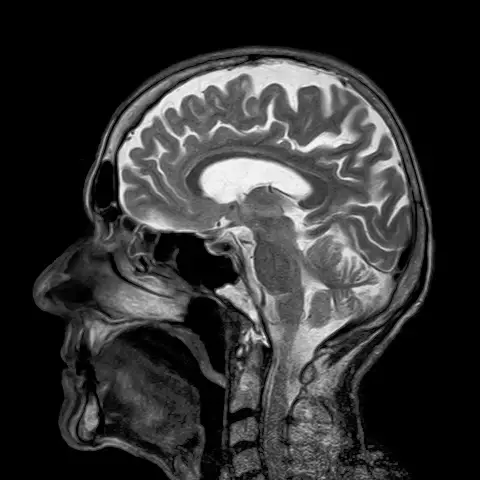- Author Rachel Wainwright wainwright@abchealthonline.com.
- Public 2023-12-15 07:39.
- Last modified 2025-11-02 20:14.
Modern medicine is a reflection of the consumer society. Dead end - there is always a way out
Coast Eugene A
associate professor of department of surgery FPK and PPV NSMU
deputy director of surgical care MSH CST
on st. Novosibirsk-Gl. OAO "RZD"
Expert scientific discussion of the project
"game professionals. What is consciousness?"
RF, Novosibirsk
E - mail: biggmen @ rambler. ru
Modern society, having gone through a long and not always positive path of change and awareness, has come to its current state, which is most clearly seen in the example of its components on which its survival and development depends. This is, first of all, healthcare and culture in its broad sense, which includes not only art, national traditions, but also education. But within the framework of this article, issues of the state of health will be touched upon.

At the present stage of development, humanity has reached its peak in the formation of a consumer society. Consumption is paramount in almost all areas. This has not spared medicine either. If we trace the long period of development of medicine as such, we will note that historically its formation originated from the human need to survive. And those doctors of antiquity who stood at the origins of the medical business enjoyed great honor and respect in society, a significant influence on people, since they allowed them to get rid of their diseases, and sometimes save the patient's life. These were people with a deep understanding of the matter and an awareness of the responsibility that falls on them. These were people of high moral character. Suffice it to recall the great doctors of antiquity like Hippocrates and his principle "Primum non nocere!"which means "First of all - do no harm!". Or the principle "Do good!", Preached by Paracelsus. In the course of its development, society has had a significant impact on the development of medicine and has led to the fact that the principles of consumer attitude to production began to penetrate into the healthcare sector. This can be clearly seen in the example of how the provision of health care became the provision of health care. The very concept of help has disappeared from the understanding of the doctor-patient interaction, and has become a service-consumer character. That is, the patient, from a person who turned to a doctor for help, has turned into a client who dictates his requests. The doctor is no longer an ally in the fight against ailment, but becomes an artisan who meets the needs of the patient. This does not take into account the fact that the person who applied for medical help,often he cannot adequately and fully assess the importance and depth of the problem he has, and adequately formulate his requests. There is one more important issue - health care financing, which is directly related to the emergence of the service-consumer relationship. In most countries of the world in one form or another, and in Russia in particular, the work of health care is based on the principle of insurance medicine with state regulation. Financial flows are based on the purchase and sale of a service. Since the insurance company acts as an intermediary between the patient and the medical professional, it begins to dictate the conditions for the provision of medical services. Criteria, requirements, standards, procedures for the provision of this service are established. And the needs of the patient himself are shifted into the background,giving way to the requirements of insurance companies, which dictate the volume and standards of medical care. Often, such requirements are significantly skewed. Medical care does not always become comprehensive, aimed at providing comprehensive assistance to a person, but turns into a limited set of services. With this approach, the spiritual and moral component in the doctor-patient relationship is lost, giving way to the material framework in which both doctors and patients are placed by holders of financial flows. Thus, there is a distance between the patient and the doctor, a wedge is driven between them. This gives rise to distrust of the doctor, who is seen not as an ally in the fight against an illness, but as a seller of medical services, and the doctor in the patient sees a potential buyer of the services he provides. This also gives rise to another unfortunate consequence of this disunity - consumer extremism. The patient sees the doctor as a seller, and sometimes a potential criminal, and the doctor sees in the patient's face as a potential litigant. Thus, a paradoxical situation arises when, instead of becoming allies in the fight against the disease, people build a whole network of obstacles among themselves, rules for communicating with each other. Before starting the treatment process, the line of defense of the doctor against the patient, and the patient against the doctor, is already beginning to be built. And this is supported at the highest legislative level, covered by the need to build trust between the doctor and the patient. In fact, significant resources are spent not on building trust, but on establishing the rights and obligations of both parties, with the prevalence of the rights of the patient and the duties of the doctor. At the same time, it is forgotten that the doctor, like the patient, are equal members of society and bear the same responsibility to themselves, society and humanity as a whole. It is forgotten that the patient himself, in addition to the right to receive medical care, is also responsible for maintaining his own health. By encouraging the principle of service-consumer interaction, the fundamental principle of medicine - prevention, is forgotten. Prevention becomes economically unprofitable in this relationship paradigm. And this is clearly expressed in the increase in the number of chronic diseases among the population, the annual increase in mortality and morbidity, which is attributed to other factors. It is hushed up that buying and selling a medical service becomes economically viable only when there is an increase in the consumption of this service. To understand this, you do not need to have an economic education, but it is enough not to take a biased look at this problem. Yes, medicine is becoming more high-tech, more perfect from the point of view of modern official science, but does this lead to an improvement in the quality of life of people? Certainly it leads to a certain extent. However, the emphasis on the development of high-tech medical care, without an emphasis on disease prevention, leads to an increase in the number of consumers of this high-tech medical service. The principles of medicine laid down by N. A. Simashko, the principles of preventive medicine are not economically profitable.but does it lead to an improvement in the quality of life of people. Certainly it leads to a certain extent. However, the emphasis on the development of high-tech medical care, without an emphasis on disease prevention, leads to an increase in the number of consumers of this high-tech medical service. The principles of medicine laid down by N. A. Simashko, the principles of preventive medicine are not economically profitable.but does it lead to an improvement in the quality of life of people. Certainly it leads to a certain extent. However, the emphasis on the development of high-tech medical care, without an emphasis on disease prevention, leads to an increase in the number of consumers of this high-tech medical service. The principles of medicine laid down by N. A. Simashko, the principles of preventive medicine are not economically profitable.

There is one more important factor influencing health care. This is the influence of political and economic relations. This is clearly seen in the example of Russia's accession to the World Trade Organization (WTO) on August 12, 2012. On the one hand, this made Russian health care more open in the international arena, increased the availability of medical care abroad, and made it possible to more intensively introduce advanced methods of treatment and diagnostics into everyday practice. On the other hand, this required a number of reforms, which are not always positive for national health care. This was due to the need to harmonize healthcare with international rules and regulations, such as the General Agreement on Trade in Services (GATAS),Agreement on the Application of Sanitary and Phytosanitary Measures (SPS), Technical Barriers to Trade (TBT), Trade Aspects of Intellectual Property Rights (TRIPS), etc. The measures taken have led to both positive and negative effects. Of course, this caused a significant increase in the level of medical care technologies, but it also created a number of problems. This is a decrease in the availability of medical care, creating a whole layer of paid medical services, this is an outflow of qualified personnel abroad, this is a decrease in the share of medicines, products, equipment of domestic production, and a number of other problems. Against the backdrop of this dramatic change in healthcare, the funding structure has changed. Health financing has become commercial in nature, regulated by market relationships. Financing of economically more profitable areas has increased, requiring significant investment, but giving a long-term and stable economic effect, forgetting that economically less profitable areas are just as important and the lack of proper financing has a price - human life. As a result of such reforms, the direction of health care development began to be determined not by the medical community, based on the needs of the population, but by market relations, i.e. medical financing companies, insurance companies.the direction of health care development began to be determined not by the medical community, based on the needs of the population, but by market relations, i.e. medical financing companies, insurance companies.the direction of health care development began to be determined not by the medical community, based on the needs of the population, but by market relations, i.e. medical financing companies, insurance companies.

Summarizing the above, we can conclude that the state of modern healthcare is determined by the division of a doctor and a patient into a consumer and a service provider, the formation of a consumer attitude of a patient to a doctor, a lack of cooperation between a patient and a doctor in the treatment process, and the division of medical workers and patients into potential criminals and consumer extremists, dependence of medicine on the requirements of insurance companies, lack of due attention to a preventive focus in the treatment process. This state of affairs cannot but give rise to the question "What to do?" Can any legislative acts change the current situation? Hardly. The answer lies in the medical specialty itself. If we turn to the fundamental, fundamental principles of medicine, we will understandthat it is based on spiritual and moral values, on the foundations of medical ethics. The high responsibility of a medical worker and his personal spiritual and moral qualities determine the entire future fate of medicine. Personal developed spiritual qualities of a medical worker put in the first place the principles of "do no harm", "do good", observe deontology, be fair, respect human rights and dignity. He looks at the health problem as a whole, as a problem not only of the physical body, but of the patient's personality, identifying the patient's personality with his own. Does not allow the destruction of such an identity. Understands the vulnerability, fragility of a person, the finiteness of his life on earth. Thus, it puts the patient's life above the economic benefits and interests of financial institutions. The formation of such a personal spiritual and moral approach to the treatment process is possible with an understanding of the dual nature of a person (https://allatra.tv/video/soznanie-i-lichnost). It is necessary to realize the presence in a person of both a material, animal component and its spiritual part, that a person, as a person, is free to choose between material values and values of a higher spiritual order. It is important to understand that nothing can prevent such a choice from being made (https://allatra.tv/video/svoboda-ot-diktatury-zverja-vnutri-tebja). Thus, the issue of the choice of the person himself, and the medical worker as well, can become the basis for maintaining high spiritual and moral values in medicine and contribute to the formation of a spiritually oriented society as a whole.

Almost every sane person is ready to accept and support with confidence that spiritual and moral values should prevail in society and in medicine in particular. But not everyone is ready to tell you how to do it. What are the really effective mechanisms and actions that can reverse this situation. It is not enough to focus on legislative acts, on changing the education system and the upbringing process of the younger generation. Many attempts, undertaken earlier and undertaken until now, have not brought sufficiently reliable and full-fledged results. The consumer attitude in society continues to gain momentum. It is not difficult to understand that the fundamental sources of the problem under consideration lie in the sphere of the person himself as a person. No legislative acts or reforms can force a person to become spiritual and moral. Moreover, attempts of this kind of coercion always cause reciprocal resistance and conflict in society. If we consider this issue from the point of view of the theory of needs satisfaction, a vivid example of which is the theory of A. Maslow, the theory of functional autonomy of motives by Gordon W. Allport and many other humanistic theories, do not provide tools for the spiritual and moral development of society. On the contrary, they are more stimulating the focus on the realization of their own needs, and primarily the needs of the material plan. But the division of the levels of human needs in itself is fraught with a rational kernel. What does it consist in? If we proceed from the fact that each person is inherently a being of a dual nature, divided into a material-oriented part,“Animal” and spiritually directed, spiritually moral, it becomes clear that human needs are multidirectional, depending on which component of a person prevails. This explains the division of needs into material needs and needs of a spiritual and moral nature (https://allatra.tv/file/9/anastasia-novykh-allatra). Based on this understanding, it becomes explainable why the theory of satisfaction of needs in practice is not always implemented. It all depends on what the prevailing point of view is the person himself. If the desire for material values prevails, the desire for self-realization as a creature living by the needs of a consumer society, then this theory turns out to be correct. However, if a person puts spiritual and moral values above the interests of the consumption of material goods, then the theory of needs satisfaction stops working. A person takes the path of his spiritual development when his personal, and often basic needs, come to the background. It should be understood not an unimportant fact. If an individual is in the predominant position of a consumer of material values, then his life and relationships with the people around him will be built according to the laws and standards of a material consumer society. If his position is spiritual and moral, then the nature of his interaction is built from the postulates of a spiritual and moral society. Thus, it becomes clear that the predominance of spiritual and moral values in the healthcare sector,as well as the formation of a spiritual and moral society as a whole is possible only if each person takes a predominant spiritual and moral position. It is the personal choice of each person that is able to make such changes in society. And this is the sphere of responsibility of each person as an individual. And this kind of decision-making by each individual does not depend on the state of society as a whole. It is necessary to clearly understand that the modern consumer society is not able to force a person as a person to make this or that choice. It can only give suggestions of one kind or another, impose its services and needs, and to accept them or not is already everyone's choice. What is our choice - such is the result we get every day. If you look at this kind of approach from a global point of view, it seems dubious,that the choice of one individual person can change anything in society as a whole. However, you need to understand the fractality of all events that take place. The state of society as a whole is a fractal reflection of the relationships between people in teams, families, and finally, a reflection of the daily decisions of each person individually. If this is so, then first of all it is necessary to understand what is the essence of everyday decision-making by a person himself, which so actively influences the state of society as a whole fractally? The answer to this question comes from understanding the dual nature of the person himself, from the presence of his materially oriented, “animal” part and the spiritual and moral component, which leaves, which can be conditionally called “angelic” (https://allatra.tv/video/illjuzija -i-put). The modern consumer society with its developed marketing sphere is a fractal reflection of this duality. In each day, it is proposed to make a choice in the direction of one or another offer, purchase a product or service of one nature or another, apply for treatment to a particular medical institution, evaluate a particular person or event. These are only proposals, sometimes quite intrusive, convincing, and directive. And the principle of receipt of such proposals is almost always the same type - this is a directive instruction for action followed by a motivational part. This kind of stereotyped proposals for making a decision can be observed in the person himself in every day. To do this, it is enough just to observe the ongoing thought process in the mind of the person himself from the side of an outside observer, or literally write down the incoming thought-directives. Thus, it becomes clear that in the course of his life, each person constantly makes a decision in the adoption or non-acceptance of certain directives and proposals. It is enough to realize that it is the everyday adoption of such decisions in favor of the material, animal, or in favor of the spiritual, angelic way of life, in favor of personal mercantile interests or in favor of the interests of the spiritual and moral development of the person himself and society as a whole, that determines fractally his choice in relationships in the family, and then in the team and in society as a whole. It is also necessary to understand the fact that having adopted the position of a spiritual and moral being,a person becomes an example for the people around him, as if "infecting" the masses with his spirituality. This is clear from the example of the work of the mirror neurons of the brain.

Summarizing the above, we can say with confidence that an effective and convincing tool that allows to shift the scales of consumer attitudes in society and in medicine in particular is the daily choice of the person himself. It is enough to abandon negative, mercantile thoughts that are destructive in favor of thoughts of kindness and love, in favor of thoughts of gratitude and a sincere desire to help every person without any personal interests, and the result will not be long in fractal time. At the same time, a sincere positive thought, backed up by deeds, becomes a bulwark of fundamental changes both in the life of the person himself and in society as a whole. And this applies not only to medical workers, who, when making such decisions, should be an example for others, but also for each person. The adoption by each person personally of thoughts and decisions of a spiritual and moral order in his life here and now, every second, will make it possible to fractally change the whole situation in society as a whole in the direction of love, compassion, mercy. And this can and should be the basis for the development of modern society.
Summing up, it must be said that it is not so important at what stage of development the modern society is, how deeply the postulates of the consumer society have taken root, it is never too late to embark on the path of spiritual and moral development. It is never too late for a person who lifts a stone to throw it at his brother to unclench his hand. Each individual, as a person, must realize that it is his decision, made here and now, that decides the fate of not only his own life, but also the life of society as a whole. This tool is quite simple, but at the same time complex. Because nothing is easier than refusing to accept negative, destructive thoughts. And the simpler it is, the more difficult it is for a person to believe and accept it. It is important to realize that there is no more opportune time to begin these changes than now. Don't put it off until tomorrowbecause a person's life is fleeting and there may not be tomorrow.

List of used literature:
Khramtsov A. F. Globalization of social policy and Russian reforms. (Scientific and analytical report). - M., 2009.
Vinogradov V. V. Economy of Russia: Textbook. - M.: Jurist, 2002.
Zhdanovskaya A. What is the WTO? In whose interests are decisions made in the WTO? Why is the WTO dangerous? // Left politics. - 2009. - No. 9. - S.38-55.
Dezhina I. “Brain Drain” from Russia: Myths and Reality. - M.: Science Science, 2011.
Ulumbekova G. E. Analysis of the availability of medicines in Russia and abroad // New pharmacy: effective management. - 2010. - No. 4. - S. 48-49.
Maslow A. Motivation and personality / A. Maslow. - SPb., 2002.-- 480 p.
Internet resource:
Internet resource:
McClelland D. Human Motivation. - SPb.: Peter, 2007.-- 672s.,: Ill. - (Series "Masters of Psychology"). Page 130
Gordon W. Allport. The functional autonomy of motives. // American Journal of Psychology. 1937. Vol. 50. P.141-156
Found a mistake in the text? Select it and press Ctrl + Enter.






